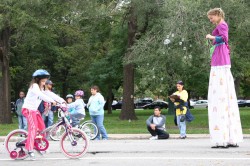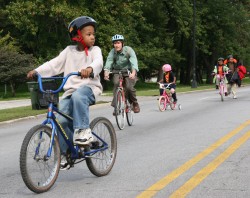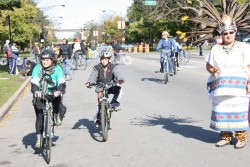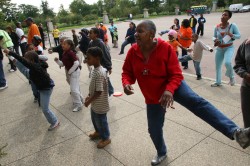Sunday Parkways: Helping Minority Communities Connect to Bicycling and Walking
Chicago, Illinois
Source: Pedestrian and Bicycle Information Center (PBIC)
Problem
In communities that lack a culture of physical activity, how can walking and bicycling become part of the solution to health issues? Effectively promoting bicycling, walking, and physical activity in Chicago's Latino and African-American communities is challenging unless advocates take the time to understand community issues and form partnerships.
Background
Health problems related to inactivity have emerged as a priority issue for families and individuals in several of Chicago's Latino and African-American communities, which also face challenges related to safety and economic depression. Five neighborhoods in particular — Logan Square, Humboldt Park, Garfield Park, North Lawndale, and Little Village — are fighting epidemics of childhood obesity and disproportionately high rates of diabetes, asthma, and heart disease. Physical activity is vital to good health because it reduces the risk of heart disease, high blood pressure, colon and breast cancer, osteoporosis, diabetes, and obesity.
Advocates at the Active Transportation Alliance (ATA; formerly Chicagoland Bicycle Federation) believe that a Sunday Parkways program can connect diverse communities to bicycling, walking, and physical activity. Inspired by Bogota, Colombia's successful Ciclovia, a Sunday Parkways event closes a network of streets to cars for a few hours every Sunday, opening them up to everyone else: pedestrians, bicyclists, people in wheelchairs, skaters, etc. In communities dealing with health, safety, and economic development problems, Sunday Parkways addresses all three. Lessons from Ciclovias in Latin America tell us that these events are an opportunity for physical activity on a mass scale. Every Sunday, 1.5 million people participate in Bogota and 400,000 people participate in Guadalajara, Mexico. Businesses along street closures benefit from slower pedestrian and bicycle traffic. Street closures also give residents a chance to explore their own community and neighboring areas in a new way.
ATA recognizes that both cultural differences and issues specific to the five communities present barriers to successful Sunday Parkways:
- Safety. The communities along the proposed route have gang activity, which prevents people from using parks, feeling safe on the street, and walking for recreation.
- Language. Three of the five communities are mostly Latino. Language can be a barrier, as well as the way information is distributed. For example, digital media aren't very effective in lower-income neighborhoods. Spanish-language materials are critical.
- Resources. There are no more than a handful of bicycle shops in the five combined communities, making it difficult for people to buy or service a bicycle.
- Perception. Bicycling seems more like a recreational activity than a way to stay healthy. Making this connection can be a challenge.
- Trust. Bicycling is sometimes viewed as a "white" sport or activity. Organizations from outside the community may not be welcome until they have shown themselves to be trustworthy and helpful.
Solution

The Sunday Parkways route in Chicago's Logan Square neighborhood, October 5th, 2008. Image: Katie Tully
Active Transportation Alliance has developed layered, context-sensitive strategies to realize its vision for a Sunday Parkways program.
Effective work in ethnically diverse communities requires both an appreciation of their differences and insight into their similarities. In Chicago, African American neighborhoods may be affluent, middle class, or low income. Latino communities reflect residents' geographic origins. Humboldt Park, a predominantly Puerto Rican neighborhood, has a different culture than Little Village, a predominantly Mexican neighborhood. A liaison to Chicago's Latino communities should speak Spanish and know the dynamics of each neighborhood. To approach the African American community about a new project or initiative, ATA contacts churches and church leaders to gain access and support.

Along Douglas Blvd. in Chicago on October 26, 2008. Image: Katie Tully
Both Latino and African American communities have strong family ties and strong connections to churches, and are dealing with issues of health. When ATA talks about bicycling, it does so in the context of improving the community's health and offering opportunities for families to spend time together.
ATA engages people of different racial and ethnic backgrounds by listening and never assuming. When ATA works in a community, it hosts open meetings and invites residents into the planning process. Steering committees made up of community members keep ATA accountable.
Strategies for promoting bicycling and physical activity
Safety. ATA works with schools and community organizations to bring Safe Routes to School programs to these neighborhoods, guiding them through the process and assisting with funding applications.
Resources. Through funding from SRAM Corporation, ATA can offer mini-grants for community projects. The Chicago Community Bike Project was awarded funds for its Mobile Bike Shop, a self-contained bike shop mounted on a bike trailer. This shop travels to different events within ethnically diverse communities, offering free bicycle maintenance and teaching basic skills such as patching flats.
Another grant recipient is West Town Bikes (WTB), a community bicycle learning workshop that offers bicycle mechanics classes, youth programs and special events. The grant supports WTB's Build-a-Bike Youth Program for low-income, at-risk and minority youth in Chicago. The after-school classes teach youth how to build and fix bicycles, while promoting healthy living and safe bicycling. They also connect students with bicycle-related job opportunities, such as the Junior Bicycling Ambassador program.
The Active Living Logan Square Partnership received grant funds to encourage more people to bicycle by creating a public exhibition with photos and stories that celebrate 40 diverse individuals from the Logan Square neighborhood who incorporate bicycling into their lives.
Health. ATA has worked hard to show the connection between walking, bicycling and health. In one program, ATA approached community clinics about disseminating "activity prescriptions" to patients. With the cooperation of physicians and clinicians, ATA dispensed approximately 10,000 activity prescriptions in clinics in Latino and African American communities. The prescriptions recommend free activities such as walking, bicycling and gardening, and list resources such as ATA, the park district and the YMCA.
Language. Program and resource information are printed in both English and Spanish. Finding the best way to distribute these resources is crucial. ATA puts information at the obvious places — libraries, schools and bike shops — but also at aldermen's offices, community centers, local businesses and laundromats.

Aztec dancers performed along the route in the predominantly Mexican community of Little Village on October 26, 2008. Image: Katie Tully
Building trust. The value of trust and name recognition cannot be underestimated. Community liaisons at the Active Transportation Alliance spend a lot of time inside targeted communities. They attend block club meetings, health meetings, and meetings dealing with open space. It may be necessary to invest time in projects unrelated to bicycling and walking until those can be added to an agenda. A partnership with an established community organization can open doors to new groups of people and create a platform for talking about walking and bicycling.
Strategies for implementing Sunday Parkways
Inspired by Bogota's Ciclovia, ATA began working on Sunday Parkways in 2005. ATA thought that Ciclovia was not only transferable, but scalable. Bogota closes 70 miles of road every Sunday, but started with about eight miles.
ATA first identified a potential partner who was doing health and active living work in the Logan Square community; ATA flew her to Bogota to see the Ciclovia firsthand and attend a conference of countries with similar programs. She returned convinced that Sunday Parkways could solve many of the issues she dealt with in her work. As a community health organizer, she identified her counterparts within each of the other neighborhoods and asked them to support Sunday Parkways. ATA next used grant funds to send a delegation from Chicago to see Via RecreActiva (Ciclovia) in Guadalajara, Mexico, and take part in a conference of Latin American countries with Ciclovia events. The delegation included representatives from each target community, the commissioner and assistant commissioner of the Chicago Department of Public Health, and church representatives.
Active Transportation Alliance partners with five community organizations (Logan Square Neighborhood Association, Bickerdike Redevelopment Corporation, Garfield Park Conservatory Alliance, Lawndale Christian Redevelopment Corporation, and the Little Village Community Development Corporation) to advocate for Sunday Parkways in Chicago. A stakeholders committee, made up of community members and representatives from neighborhood associations, churches, businesses, block clubs, and non-profit organizations, drives the event. Most of the work and planning for Sunday Parkways, such as the route and periphery activities, have been organized at the grassroots level by people living and working in the five targeted communities.
Community health workers on the Sunday Parkways Stakeholder Committee were instrumental in gaining the consent of local aldermen. Because they were already active in the community, they had reasonably easy access to their representatives. ATA asked each alderman which constituency within the community needed to get behind Sunday Parkways in order to earn the alderman's support. Some offered their approval based on a description of the project. Others required organizers to target specific groups along the route, such as churches, park space users, and residents. With these constituents on board, their aldermen followed.
Result
Support from community members, neighborhood associations, churches, businesses, and block clubs helped leverage support from all of the aldermen along the Sunday Parkways route. This broad-based coalition secured permission from the City of Chicago to pilot Sunday Parkways through the five targeted communities in 2008. The 2008 Pilot events, on October 5th and 26th from 9:00 A.M. to 1:00 P.M., successfully brought people to the event, though many of the participants were from affluent neighborhoods. The following event, which occurred in 2009, expanded the route from 4 miles to 8 miles and was much more successful in attracting participants from the targeted neighborhoods. Following an evaluation period, further events were planned for 2010.

Dance aerobics at the Humboldt Park Activity Station. Image: Katie Tully
The partners developed enough funding through shared grant proposals to pay for two Sunday Parkways events, including activity stations for yoga, aerobics, and dance classes along the route's periphery. Funding will pay for the staff time of an event organizer, an event production manager, and city services such as Traffic Control Aides, Chicago Police Department presence, barricades, and city permits. Following the 2008 Pilot events, costs decreased substantially. By soliciting corporate sponsorships and refining marketing and organizing efforts, the event has been promoted to a greater degree and was funded in 2009 with city support.
ATA completed several evaluations to make the case that Sunday Parkways should be a city-owned and city-run event. One focused on the amount of city services and staff required for the event. It was found that the 2009 event required the same number of staff as the 2008 events, though the route had increased from 4 to 8 miles, which signifies a substantial decrease in cost. The second evaluation assessed the number of participants and benefits to participants. By coordinating with researchers at Northwestern University and the University of Illinois, the organizers were able to develop a counting system for participants as well as a survey to solicit feedback from the event. The 2009 event drew more participants from the targeted neighborhoods and was substantially cheaper than the initial Sunday Parkways events.
Cost
Grant funds to support the Sunday Parkways initiative came from the Local Initiative Support Corporation New Communities Program, the Boeing Foundation, Bikes Belong, Bank of America Foundation, Chicago Community Trust, Michael Reese Health Trust, REI, and the League of American Bicyclists. ATA has contributed from its general operating budget by combining the work of one of the community liaisons with organizing for Sunday Parkways. ATA has also committed to cover a $50,000 gap in funding. So far, over $200,000 has been raised for the project, toward a goal of $250,000.
The Chicago Park District provided about $30,000 of in-kind support, including activity station instructors, stages and sound equipment, permits, and staff time dedicated to organizing activity stations.
Underlying the cost of the event itself is the staff time needed to learn about priority issues within a targeted community and connecting programs to those needs. The Active Transportation Alliance recognizes the importance of building these kinds of relationships and has two staff members who work on building relationships within Chicago's diverse communities.
Web Sites
Active Transportation Alliance: http://www.activetrans.org/
Sunday Parkways: http://www.biketraffic.org/content.php?id=1550_0_8_0
West Town Bikes: http://westtownbikes.org/about
Sreetfilms video of Ciclovia: http://www.streetfilms.org/archives/ciclovia/
Contact
Adolfo Hernandez
Community Liaison
Active Transportation Alliance
9 W Hubbard, Suite 402
Chicago, IL. 60610
312-427-3325
ahernandez@activetrans.org
http://www.activetrans.org/
Image Source
Katie Tully




